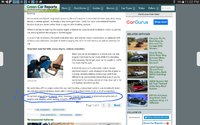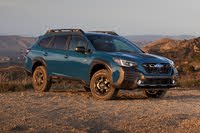Do you think that clock hours should replace mileage odometers on cars?
Asked by Mark Nov 24, 2015 at 08:10 PM about the 2010 Subaru Outback 2.5i Limited
Question type: General
Would it be advantageous to have both clock hours and mileage track the age
of vehicles? After all, a lot of cars get stuck in very long commutes and
intense traffic resulting in extra hours and minutes logged on the engine?
With only an odometer, there's no way to know the true picture of how many
hours the engine was running? Do you think that car manufacturers should
add this into new vehicles?
22 Answers
Mark,i have thought the same thing before,they do it on anything from tractors to lawn mowers and a lot of rental machine eqipment,it would help the exact time of the hours on the engine,but i think it should have both IMO.
A lot of fleet vehicles already do this. High idle hours might help tell you what shape the catalytic converter is in.
KenF, so , you're saying that the long idle times would cause more damage to the catalytic converter? I wonder if you could add this hours feature to a scan gauge? Of course, to be precise, you would need to do this starting out on a brand new car.
How many hours do you think would be equivalent to 100,000 miles with a 50-50 city and highway miles?
Just a guess Mark ,but i would think around 350_400 hours.
I'm mostly familiar with Ford fleet cars, and according to them 1 idle hour is equivalent to 33 miles driving. Keep in mind this is an idle hour meter, versus an engine hour meter. Fleet vehicles tend to stay running at idle for long periods of time, think cop cars, taxis, etc. The damage to the catalytic converter from idling is that you are allowing more carbon and condensate to get into the cat, see: Is Engine Idling Damaging Your Engine? http://autorepair.about.com/library/a/1h/bl151h.htm - is says: "an idling engine may not get hot enough to start the catalytic convert working or hot enough to run efficiently. It may also load up the catalytic converter with fuel that could lead to an early demise of the catalytic converter."
PS: fleet vehicles are built for this type of duty, so that is why they tend to track engine and/or idle hours, I don't see the necessity in a regular-use vehicle, but with everything so computerized, probably wouldn't be that hard to add.
KenF, this is interesting, so, cars like the Prius and other hybrid cars with start and stop engine technology, those cars are not subject to the same kinds of stresses because they're shutting down and this saves wear and tear on their engines, thus resulting in longer duty cycles. Does this make sense to you.
T_S_T, don't know why, but that estimate of 350 to 400 hours for 100,000 miles surprises me. Why? Consider this, let's assume an average speed of 60 miles per hour and divide this into 1,000 miles, which would give you 16.6 hours of driving. Next, let's assume that you only consider 50,000 miles, and, if you multiply this 16.66 by 50, you would have 833 hours, and we have not even factored in the city traffic of the other 50,000 miles and the idling in traffic. Do you see what I mean. Or, am I missing something here?
TheSubaruGuruBoston answered 9 years ago
To your prior point: NO! The worse thing to do is to cycle thermodynamically by having auto-shutoff. Sophisticated electro- mechanical systems want to run isothermally. Turning them on and off wears them out more quickly...just like light bulbs and switch contacts.
TheSubaruGuruBoston answered 9 years ago
So I see you picked up on my prior assertion that clock hours are FAR more important than odometers for "guessing" wear. No doubt there's an educated consensus here....
I know in the trucking industry and fleet vehicle maintenance they do pay more attention to engine hours/idle hours then mileage to get a better picture of when to perform engine maintenance. Use mileage to determine when to perform maintenance on the suspension/wheels, engine hours for engine/trans maintenance. High idle hours are tracked as that can be another maintenance issue, namely build up of moisture/condensate and volatiles in the crankcase and other places (like the cat). I'm sure this type of detailed tracking could be useful in smaller cars in regards to maintenance. You could also track fuel consumption as well to determine intervals for maintenance.
Volvo trucks do it now, even measures fuel consumption at idle versus fuel consumption under load, with all the computerization going on would probably not be hard to extend this type of tracking to small cars. I think the biggest hurdle is that car makers try to keep their unit costs down, every nut and bolt is designed to minimize costs, so adding a big feature like more gauges or sending units would increase costs. You know it'll come down to the bean counters to decide if they can sell this type of feature.
TheSubaruGuruBoston answered 9 years ago
Can you imagine the horrors this would do to the consumer market? Valuation is strictly assessed by age and mileage. You'd have folks turning their cars off at stop lights just to reduce depreciation! Ha.
Oh wow! So, what you're saying is all these cars that have the stop, start technology designed to save gas are more likely than regular cars that continue running will wear out their engines faster?
Here's an interesting question, do you think it's easier for a car to log 200,000 miles in the first three years of its life than 200,000 over 15 years? It seems like this very likely is the case since I've talked with some taxi and Uber drivers with 235,000 miles on their three or four years old Prius vehicles.
Well, over the years they've added so many features to cars, maybe you are old enough to remember that cars in the 60s mostly featured a radio, heater, power steering and automatic transmission. Now the bar has been raised substantially, with all electrics, dual climate control, navigation, pre-collision braking, etc. No wonder cars have increased in price so much. Most cars today cost as much as homes from the 60s. Inflation helped this along as well, but, certainly all the bells and whistles had an impact. SO, it's not inconceivable about this extra added gauge on engine hours, but, it would change the culture on how cars age! Not sure everyone would be ready for that.
TheSubaruGuruBoston answered 9 years ago
Yes. Longevity is being compromised for small fuel eco via start-stop frequency.
I found this online, one would hope that they had this covered in the new technology? I really don't know. http://www.autocar.co.uk/car-news/new-cars/stop-start-long-term- impact-your-car-s-engine
Apparently, not everyone is in agreement on this, see picture,
An article from Edmunds, says that it's not hard on the engine, but, it is on the battery and starter, see this,



